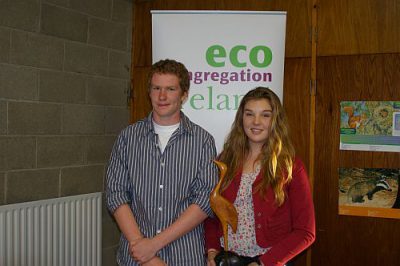
Congratulations to David Kane of St St Kilian’s Deutsche Schule, Dublin, who won Three Rock Churches’ Environment Group’s recent essay competition on the subject ‘Our Planet, Our Home. What is its Future?’
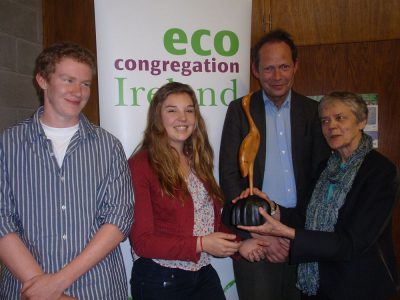 Presenting him with first prize at an awards evening in Dundrum Methodist Church, adjudicator Sylvia Thompson of The Irish Times said his essay showed “an understanding of how change is necessary and the importance of politics to bring about such change.”
Presenting him with first prize at an awards evening in Dundrum Methodist Church, adjudicator Sylvia Thompson of The Irish Times said his essay showed “an understanding of how change is necessary and the importance of politics to bring about such change.”
David’s essay looks into a future where innovations we are
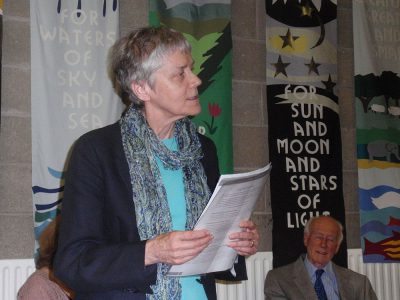
now only getting to grips with have become a reality. Renewable energy has become the sole source of energy with cars and trucks running on electricity. Road taxes have increased significantly so that the primary means of transport is free public bicycles and public transport, like carbon-neutral
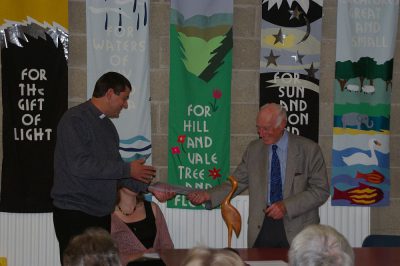
buses. Houses are all fitted with solar-panelled roofs and wind turbines, and cooking is carried out on electrical hotplates.
The drastic measures introduced under an International Environmental Pact in 2030 were essential for the well-being and 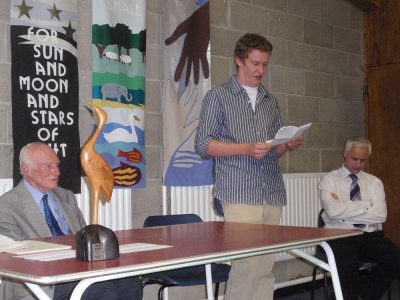 survival of all peoples. “Although life on Earth is not as lavish as it used to be, most people were willing to accept these new changes, some more difficult than others … in exchange for a safe and survivable world,” writes David.
survival of all peoples. “Although life on Earth is not as lavish as it used to be, most people were willing to accept these new changes, some more difficult than others … in exchange for a safe and survivable world,” writes David.
“I hope that our current leaders and citizens alike
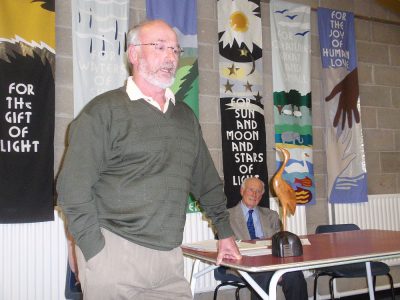
eventually stop denying the fact that we are harming our planet. If the warnings are ignored, the planet we call our home will die with us. Ultimately, Earth is our planet, our home, and it is solely down to us to save its future.”
Sylvia Thompson highly commended an essay by Siobhan McKenna (also a St Kilian’s student) which she said “sweeps the reader through different places over time and … she does open our minds to how the world changes over time and that in itself should encourage us to embrace renewable energies and retrofitting our homes to conserve energy as a means to protecting our planet.”
Siobhan’s imaginative essay takes the form of a number of letters and diary entries, ranging from the year 850 to 2350 when everyone is living underwater! “I guess they never thought that scientists would be able to figure out how it was possible for us to live under water,” she writes. “As global warming became worse in 2100 the sea rose so fast everyone was starting to panic. I guess someone had to fix it. I can’t imagine the human race being extinct. We are too smart to die out. I don’t really know what will happen in the future. Everyone has just adapted to living under water over the last 50 or so years.”
Before writing their essays, entrants were encouraged to watch Yann Arthus-Bertrand’s film “Home” (the film can be viewed by Googling home-2009). They were also asked to consider the UN statement that “human activity is causing the diversity of life on earth to be lost at a greatly accelerated rate. These losses are irreversible, impoverish us all and damage the life support systems we rely on every day. But we can prevent them.”
Catherine Brennan SSL, chairperson of Eco-Congregation Ireland, presented a beautiful sculpture of a heron to St Kilian’s. She congratulated them and thanked them for all that they were doing to promote right relationships with others, with God and with the whole community of Creation. Quoting Margaret Mead, she said: “Never doubt that a small group of thoughtful, committed citizens can change the world. Indeed, it is the only thing that ever has.”
The sculpture was the work of Laurence Darcy who made the heron out of yew and placed it on a piece of 5000-year-old bog oak. He explained that the heron stood for intelligence and creativity.
Dean Eaton, Assistant Environmental Awareness Officer with Dun Laoghaire Rathdown County Council, spoke about how “from little acorns mighty oaks grow” and congratulated St Kilian’s on being awarded with a Green Flag the previous day. He said that China was copying An Taisce’s green schools programme by trying it out in 1500 of its 1 million primary schools.
Three Rock Churches’ Environment Group is an initiative of Eco-Congregation Ireland, which consists of seven churches in south Dublin working together on environmental issues. The group consists of Methodist Church, Dundrum; Holy Cross, Dundrum; Church of the Ascension of the Lord, Balally; Religious Society of Friends (Quakers), Churchtown; and the Church of Ireland parishes of Whitechurch, Kilternan and Taney.
As well as organising an annual essay competition for Transition Year students, the group also holds ecumenical prayer services, screens environmental films and is involved in Stop Climate Chaos demonstrations.
It would be great to see more groups of churches working together in this way throughout Ireland!
Here follows the full text of the winning essay by David Kane and Siobhan McKenna’s highly commended essay:
Our Planet, Our Home. What is its Future? ~ David Kane
These days, all we hear in the news are stories of political unrest and the consequences of climate change. Although some believe that these tales of impending doom due to global warming are simply a means of scaring us into spending more money, I believe that the writing is on the wall for serious environmental changes in the future. In my opinion, people need to take responsibility for the actions they take which in some way or another impact on their carbon footprint. Hopefully the recent increases to the occurrences of natural disasters and more noticeable changes in temperatures will spark a movement of reducing carbon emissions.
Looking optimistically forward, if the advice of experts is heeded and world carbon emissions do indeed drop, I feel that the world will be a better place for all, if at the expense of lavish lifestyles and excessive luxury. Petrol and oil will become things of the past with renewable energy becoming the sole source of energy. Power plants and oil rigs will be replaced with wind and solar farms as well as hydroelectric and tidal generators. Cars and trucks will run on electricity and therefore have no impact on carbon emissions. However, road taxes will increase dramatically so the primary means of transport are free public bicycles and public transport like carbon-neutral buses.
At home, gas heating will be long forgotten. All houses will have solar panelled roofs and wind turbines. Cooking will be done on electrical hotplates. However, few meals will need cooking now that developed countries have promised to only consume home grown products. Some older citizens may remember the days of daily meat and foreign cuisine. However, most are now accustomed to the diets on which their countries grew. Those countries slightly less off, like those in the recently formed African Union are supplied by an international food levy which ensures that 90% of people eat two meals a day.
The changes brought about by the International Environmental Pact in 2030 had a huge effect on the world politically. Despite early disagreement to some of the changes it proposed (like the food levy and ban on food imports) from richer Developed World countries, world leaders eventually agreed that drastic measures needed to be taken to ensure the wellbeing and survival of their peoples. By 2030, the hole in the ozone layer had spread from around the South Pole to half of Australia and the southern countries of South America and Africa. In these countries, drought destroyed harvests and skin cancer rates rocketed. When Australia was declared as no longer a Developed country, the UN wrote up this Pact.
Although life on Earth is not as lavish as it used to be, most people were willing to accept these new changes, some more difficult than others (The ban on non-renewable powered aircraft cut many off from their families), in exchange for a safe and survivable world. In a recent newspaper interview, former United States president Barack Obama, now aged 65 years, said that the only regret he had about the way in which his generation treated the planet was that “people were to selfish to see the need for change”.
I hope that our current leaders and citizens alike eventually stop denying the fact that we are harming our planet. If the warnings are ignored, the planet we call our home will die with us. Ultimately, Earth is our planet, our home, and it is solely down to us to save its future.
OUR PLANET, OUR HOME, WHAT IS ITS FUTURE? ~ Siobhán McKenna
Sydney, Australia – 1915 – Caitlin
Dear Doug,
I still don’t understand why you had to leave. I’m trying, I honestly am. I know that we are helping England fight the Turks but I still don’t know why we have to be the ones to help, it’s all so complicated. Everything is fine here I guess, Mum is ok although I can tell she is just trying to be strong for me, I can tell she’s scared you won’t come back. Dad’s working a lot, I think teaching keeps his mind off things he doesn’t want to dwell on. I’m pretty good. Besides missing you and being confused about it all. School is ok, Jesse said to say hi.
They say this is the last war, the Great War, which means it will all be over after this. Our future would be full of peace and love. I don’t know whether to believe this or not. I like to think that it’s true. I pray every day for you to come home safely.
I hope its ok there. Have you made any friends? I don’t really know what you do at war. I hope it’s not all bad.
Love Caitlin xx
Amazon River, Northern Brazil – 1980 – Rafaela
Dear diary,
Mama says they will come today, she said they will take the trees. I can tell she is unhappy because she fears we will have to move to the town if they come to close to us. I hope they know we are here; I don’t want them to take our house because they can’t see it. Mama says they use special machines to take the trees. I want to go down to the river and see for myself but Mama won’t let me. I wonder what will happen when they take all the trees in the world. Then there will be none left for us to build our houses or for the birds to build their nests in. I think these people are very selfish to take all the trees for themselves. I don’t want to move into the town it is noisy in there and there are no animals. I like to go and play in the river after school, it’s so nice after being in town all day.
I think I will try and sneak out to go and see what the big machines look like. Maybe I can tell them that it’s not good to take all the trees. I love the trees, I’m glad I don’t live in the future for then the men with the machines might have taken all the trees in the world.
Juba, Sudan – 2011 – Wasi
Dear Dubu,
I wonder what our new country will be named. I would like it to be called Dekai because it means hope. It is a big shock that we are going have a new country. I hope we can make it a good one. I think if everyone puts in the effort it will be. I know you’re not awake yet but the nurse says you will wake up any day now so I’m writing you this letter so you will know what has been happening while you have been recovering. The nurse says your leg will hurt a lot at first but it will heal. You were hit by a land mine just in case you don’t remember. We are all fine I miss you telling me stories before I sleep but when I come and see you I will tell you one that I have made up, I hope that you will like it.
I think the future will be bright soon. We are going to be part of a brand new country. Imagine! They haven’t even named it yet. Maybe we will be a rich country eventually. I have been very good. I look after Susui and Rywki and get water for mother and cook for the family. Everyone is very worried about you but I assure them you will be ok. Sasu said I should write you a letter because she can’t write and we can’t come and see you yet. It is very hot I think if it gets any hotter the whole world will burn to a crisp! Hope to see you soon.
Love Wasi
Shanghai, China – 2020 – Zhao
Dear diary,
I really think this world will explode soon. There is so much pollution in the air, on the ground, in the water! It’s everywhere! Plus it’s so hot and all you can see is buildings. We went to India on holiday a couple of weeks ago and it was the same there. I wonder if it’s the same everywhere. People say Australia is beautiful but now that it’s at war with New Zealand no one wants to go there. America would probably be nice.
I think when I grow up I will move to the country. Although there’s not a lot of it left. Apparently it’s very expensive to live there. I went for a walk this morning to meet Wei in the park but the park was so packed I couldn’t stand it. It’s always been this busy here but you get used to it. I used to think I could move away when I grew up but now I understand it better and realise that it will be very hard to fulfil that dream.
Denmark – 850 – Ida
Dear diary,
We are on the ship on a trip to conquer lands. I don’t know where we are going but Far does and he insists that we will discover all sorts of lands on this trip. I wonder whether we will have to fight for these lands or whether they will be uninhabited. I hope there will be nice food in these new lands maybe they will have other things to eat besides deer, fruit and Viking biscuits. Maybe there will be different things to make weapons out of. I like not knowing what is coming, it’s like a surprise.
We have just reached land and Far and all our ship’s crew built a huge wall near the sea. I think it is so that people won’t be able to get in. I wonder how long the wall will stay there for. Maybe people in the future will look at the wall and remember us as the people who built it or perhaps it will just crumble. It is so cold on the ship some of the men working on deck go blue. I hope the next land will be warm. Being a Viking is hard work.
New York, America – 2350 – Serena
Dear diary,
I was listening to a song the other day and it was called ‘3000’. It was so funny and it goes like this: “I said I’ve been to the year 3000 not much has changed but they lived under water”… and I nearly believed that he really had been to the year 3000 because how else would he know that we lived under water. I checked the date that the song came out and it said 2001! That’s more than 1000 years ago! I guess they never thought that scientists would be able to figure out how it was possible for us to live under water. As global warming became worse in 2100 the sea rose so fast everyone was starting to panic. I guess someone had to fix it. I can’t imagine the human race being extinct. We are too smart to die out. I don’t really know what will happen in the future. Everyone has just adapted to living under water over the last 50 or so years.
School was so boring today, well it is every day. I don’t see the point of going to school when the computer does everything for us. You don’t even have to be smart to do what you want to do when you grow up so what’s the point? I’m so tired I had to swim all the way home! Mum wouldn’t even come and pick me up in the sub!
I am so keen to go out tomorrow night! It’s going to be mad! They just opened a new club for under 18s up the road from me! Everyone is going because it’s the opening! But for now I’m going to sleep! I’m too tired to keep writing. My future is to dream!
 Congratulations to David Kane of St St Kilian’s Deutsche Schule, Dublin, who won Three Rock Churches’ Environment Group’s recent essay competition on the subject ‘Our Planet, Our Home. What is its Future?’
Congratulations to David Kane of St St Kilian’s Deutsche Schule, Dublin, who won Three Rock Churches’ Environment Group’s recent essay competition on the subject ‘Our Planet, Our Home. What is its Future?’ Presenting him with first prize at an awards evening in Dundrum Methodist Church, adjudicator Sylvia Thompson of The Irish Times said his essay showed “an understanding of how change is necessary and the importance of politics to bring about such change.”
Presenting him with first prize at an awards evening in Dundrum Methodist Church, adjudicator Sylvia Thompson of The Irish Times said his essay showed “an understanding of how change is necessary and the importance of politics to bring about such change.” now only getting to grips with have become a reality. Renewable energy has become the sole source of energy with cars and trucks running on electricity. Road taxes have increased significantly so that the primary means of transport is free public bicycles and public transport, like carbon-neutral
now only getting to grips with have become a reality. Renewable energy has become the sole source of energy with cars and trucks running on electricity. Road taxes have increased significantly so that the primary means of transport is free public bicycles and public transport, like carbon-neutral  buses. Houses are all fitted with solar-panelled roofs and wind turbines, and cooking is carried out on electrical hotplates.
buses. Houses are all fitted with solar-panelled roofs and wind turbines, and cooking is carried out on electrical hotplates. survival of all peoples. “Although life on Earth is not as lavish as it used to be, most people were willing to accept these new changes, some more difficult than others … in exchange for a safe and survivable world,” writes David.
survival of all peoples. “Although life on Earth is not as lavish as it used to be, most people were willing to accept these new changes, some more difficult than others … in exchange for a safe and survivable world,” writes David. eventually stop denying the fact that we are harming our planet. If the warnings are ignored, the planet we call our home will die with us. Ultimately, Earth is our planet, our home, and it is solely down to us to save its future.”
eventually stop denying the fact that we are harming our planet. If the warnings are ignored, the planet we call our home will die with us. Ultimately, Earth is our planet, our home, and it is solely down to us to save its future.”